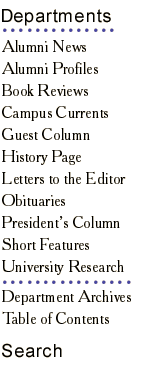

|
 Cover photo by Doug Prince 
|
A Midsummer Night's Dream Even for motivated students, Cambridge classes can resemble a slalom course from fear to confidence. "I am no longer intimidated by Shakespeare," says Nancy Eichhorn '92G, a UNH graduate student who, like many others, emerged shaking from the first meeting of her Shakespeare course with a Cambridge professor last summer. "Seeing the plays, discussing the different interpretations--how the players worked, how the theaters worked, the cultural dynamics at the time--all played into my understanding of the works. I feel at peace with Shakespeare." Cambridge provides its own kind of education. People from every country on Earth visit this city of 110,000 to tour or study, lending the city a diversity that, as Inglis says, "kids like me from New Hampshire had seen only on TV." From the gate of Caius, students can walk amid this diverse throng to an impressive array of stores and restaurants, outdoor markets, exquisite gardens and world-class free museums. They can attend plays at the university playhouse where John Cleese and Emma Thompson got their start, or choose each night from a half-dozen Shakespeare performances under the stars. They can sample a list of concerts that seems impossibly broad for a city that size: classical and choral, jazz and rock, organ recitals and the huge Cambridge Folk Festival. They can jump on a train and in an hour reach London--and from there, anywhere in the world. With so many choices, each student creates his or her own private version of the Cambridge program. For photo number one in their mental albums, some students might choose the peaceful orchard at Grantchester, where they sunbathed in green sling chairs and discovered that clotted cream tastes much better than it sounds. Others might pick the spectacle of 10,000 bagpipers, the largest assemblage in history, marching for hours down Edinburgh's streets. Or a snapshot of The Princesses, four young women who treated themselves to a luxury weekend in London, complete with lunch at Harrod's, and returned wearing four identical tiaras. Or the blindingly sunny day at the outdoor Globe Theatre, where the participants--who barely knew one another at the time--spent the afternoon smoothly swapping tickets so that everyone could try both a seat and the experience of standing in the dirt to see Hamlet as a "groundling."
Individual and collective memories of the summer gradually merge. Neither J.J. Jeong nor anyone who witnessed it will forget his rendition of "Hey Jude" at the Red Cow. "That was a point of my life where I suddenly felt that I became alive," says Jeong, who attends SUNY-Buffalo and forgives Americans' inability to pronounce his real name, Jeong-kyun Jeong. And no one who stood waiting at the program bus late one Saturday night in London will forget the sight of Jeff Heller coming down the street in a previously unknown combination of limping and floating. The limp was because his feet were bloody from walking the city in uncomfortable shoes. The floating was because of serendipity. Heller, an Allegheny College junior who had acquired the nickname Shakespeare Boy for his allegiance to the Bard, had managed through sheer happenstance to show up at the Globe Theatre just in time to join a class. And then into the class strolled Mark Rylance, the lead actor in the production of Hamlet the students had seen the week before. And Heller got to read a scene with him--with him, Mark Rylance, artistic director of Shakespeare's Globe Theatre and "the best Hamlet I'd ever seen." When Heller told the other students about his experience, they were as excited as he was. "I can't believe how supportive the entire program was about my love of Shakespeare," he says. "It inspired me to follow my passions." Leon Lum also found inspiration in Cambridge, where no one thought it strange that he, with his engineering degree, should harbor a passion for history. After a summer working and playing with the tight-knit group of history students, Lum returned to California and a job as a bioengineer. But the summer gave him the courage to plan the next stage of his life's adventure: applying to grad school in history or international relations--maybe even applying to Cambridge.
The students who edge timidly through the Gate of Humility each July head out each August with new confidence and other souvenirs they can't pack into suitcases: a broader view of the world and of themselves, and an unrelenting yen to keep traveling. The stories they tell become the program's story. Alyssa Abraham: "I saw that I am a capable person. I can read a map, make an international phone call, change money, and live on a budget--almost. I realized that all I really need for survival is a backpack and a toothbrush and a little human contact." Jorie Cohn: "I found that I could be a problem solver, relying on nobody but myself. This trip has taught me that I am a much stronger person than I ever gave myself credit for." Nancy Eichhorn: "How I view myself changed dramatically. I found my voice." And the final word goes to Therese Hickey, the California girl who feared she'd die of hypothermia in those first cold days at Caius. "Lost among alien people in unfamiliar surroundings," she says, "I found me." ~ Jane Harrigan, a professor of journalism at UNH, taught travel writing in the 2000 Cambridge Summer Program. The former managing editor of the Concord Monitor, she is the author of two books, Read All About It and The Editorial Eye.
See also: Easy-to-print version Return to Spring '01 features blog comments powered by DisqusCurrent issue | Past issues | Class notes Department archives | Send a letter/news | Address updates Advertise | About UNH Magazine | Alumni home | UNH home University of New Hampshire Alumni Association 9 Edgewood Road Durham NH 03824 (603) 862-2040 alumni@unh.edu |